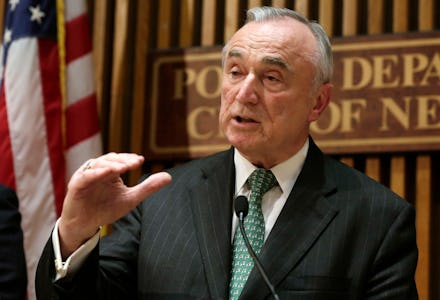Bill Bratton to Announce Resignation from NYPD 1 Day After Black Lives Matter Demands It

New York City police Commissioner William Bratton will resign as the top official of the nation's largest police force, Mayor Bill de Blasio announced Tuesday. Bratton, considered among activists to be an architect of intrusive policing in communities of color, will be replaced by James O'Neill, the NYPD's chief of department.
"Jimmy is one of the best prepared incoming police chiefs this city has ever seen," de Blasio said during a press conference from City Hall. The mayor trumpeted O'Neill as the visionary behind policing strategies that "will make us safer and bring police and community closer together."
De Blasio, who as the city's public advocate had been a staunch critic of Bratton's policing strategy while he sought election for mayor in 2013, also paid tribute to the outgoing commissioner. He credited Bratton with bringing city crime to "record lows."
"We will never forget or fail to honor the achievements of Bill Bratton," the mayor said. "We remember what this city used to be like. Quality-of-life offenses went without notice because they were so common. Bill Bratton changed that for all of us. It wasn't enough to end the bad; we had to start working toward the good."
Bratton said Tuesday he was leaving for a new job, but declined to elaborate. He lamented resigning amid a "crisis of race in America" related to policing in communities of color. "I'm leaving with reluctance," he said. "I wish I had more time. But I received an offer that's extraordinarily exciting."
Of his replacement, the outgoing commissioner said in a statement that "few understand the human side of policing better than Jim O'Neill."
The announcement came just one day after Black Lives Matter activists in New York City occupied City Hall Park and called for Bratton's resignation over recent police shootings and other alleged misconduct by law enforcement officials. After news of Bratton's resignation broke Tuesday, about a dozen protesters holding signs gathered outside of City Hall, chanting, "Na na na na, goodbye!"
Demonstrators said Bratton's exit was just the first of three objectives. Their other two demands included "reparations for all victims and survivors of the NYPD's racist murder and brutality," and defunding the NYPD's massive budget, according to protesters.
"The new police commissioner, James O'Neill, if he continues to the same policies [as Bratton], he will meet with the same fate," said Nabil Hassein, a 27-year-old organizer with the group Million March NYC, during a demonstration outside of City Hall.
On Tuesday, de Blasio pushed back on the notion that protesters had prompted Bratton's resignation. "The protests 110% had nothing to do with this," the mayor said, adding Bratton had let him know of his resignation on July 8.
Bratton, 68, is best known as the champion of "broken windows" policing, a strategy that prioritizes enforcement of low-level, quality-of-life laws in order to curb larger crimes. The practice was soon maligned by civil rights activists as "stop-and-frisk" — and in 2013, a federal judge said the New York Police Department had violated the constitutional rights of minorities when officers stopped, questioned and gave pat-downs to mostly black and Latino residents whom they viewed as potential crime suspects.
Bratton adopted that policing strategy with the Los Angeles Police Department, where he served as chief from 2002 to 2009. He had previously served as commissioner of the NYPD under former Mayor Rudy Giuliani, from 1994 to 1996, when the city saw a large reduction in crime. In the year he left the LAPD, a majority of Los Angeles residents approved of city police performance, the New Yorker reported. Following the mayoral election in 2013, de Blasio appointed Bratton as NYPD commissioner.
In recent weeks, the police-involved shooting deaths of black men, including Alton Sterling and Philando Castile, renewed nationwide protests over excessive uses of lethal force among officers. Under Bratton, protests erupted in New York City, in the wake of the 2014 police chokehold death of Eric Garner in the city's Staten Island borough. The assassination of police officers by black assailants in Dallas and Baton Rouge, Louisiana, further strained racial tensions.
"We're on a journey, and it's not a journey that's unique to New York City," Bratton said Tuesday. "We're farther along in New York City, in terms of training, tools and our commitment to neighborhood policing."
Mic's Jamilah King and Stefan Becket contributed reporting.
This is a developing story and will be updated.
Aug. 2, 2016, 2:47 p.m. Eastern: This story has been updated.
Correction: Aug. 2, 2016